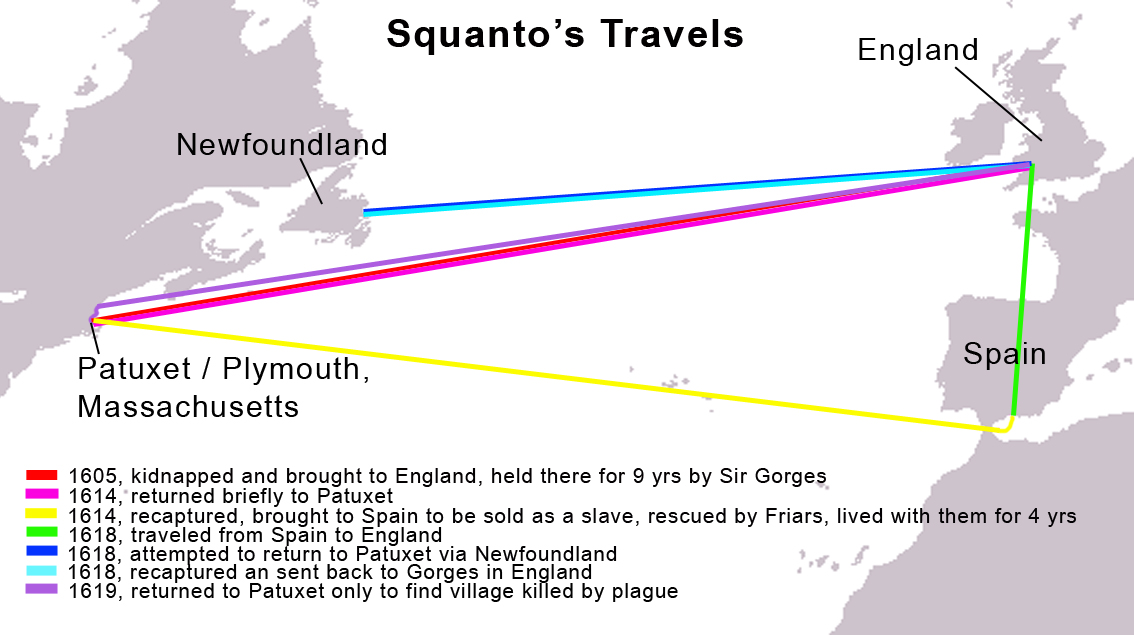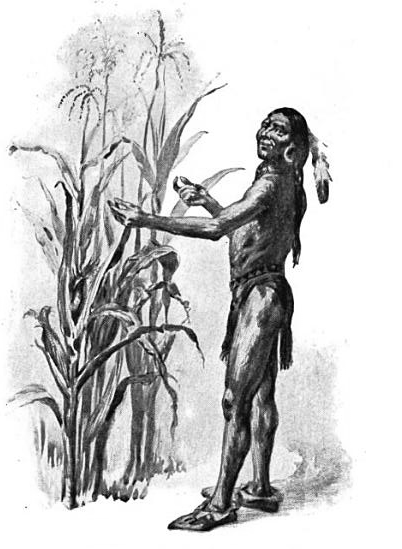.1200w.tn.png)
The day I had longed for for so many moons was finally here. I was almost home! I stood on the bow of the ship watching as the shoreline came into view. My heart pounded with anticipation! I could almost hear the shouting, drumming, and dancing, and taste the great feast my family would serve to welcome me home. I couldn't wait to see their precious faces and tell them about my second kidnapping five years ago in 1614.
Squanto is Kidnapped
You see, my troubles began in 1605 when I was just a young teenager, living in what later became known as Massachusetts. I was kidnapped and taken to England, where I learned to speak English and taught the white man about our land in America. After nine long years, Captain John Smith brought me home. However, only days later, I was kidnapped a second time.
An evil ship commander, Captain Hunt, tricked me and 26 other Indians who had gone onto his ship to trade with him. He chained us in the bottom of the boat and took us across the ocean and sold us as slaves. But God was able to use Captain Hunt's evil for (my) good. A good man, a monk, bought me and took me to Spain.
He told me about the new god-man named Jesus. Despite the monk's kindness, I still longed to be with my people, the Patuxet tribe.
The compassionate monks sensed my heartache and helped get me back to England, where I found passage on a ship to North America. When we stopped in Maine, I met Samoset, a Native American like myself. His Indian clothes and moccasins made me even more homesick. I greeted him with a raised hand to show friendship. "I am Tisquantum," I said. "The English call me Squanto. I am returning to the Patuxet tribe, no longer a slave." I was glad for Samoset's friendship in the weeks to come.

Squanto Returns Home
At last, our ship pulled into the harbor. I slid down the rope over the side of the ship and into the waiting canoe. The land of my childhood looked deserted, but I thought I knew why.
They probably saw this English boat coming and hid in the woods. I'll call my family. They will answer.
All the familiar places were still there. I ran into the woods calling my father and mother, anticipating a joyful reunion.
No answer.
I called the familiar Indian whistle, the one that sounded like a frightened bird.
Still there was silence.
My heart began to thump. I raced through my land, searching wildly for my tribe.
Samoset's birdcall beckoned me to him. I found him squatting over something in a clearing. I gasped at what I saw there. Human bones and skulls were scattered on the ground.
Samoset got up and walked away, disappearing into the woods. I searched until sunset, finding more bones, a pair of moccasins, and a few arrowheads.
Finally Samoset returned with the worst news. The chiefs of the next village had told him of the Great Plague of 1616. The entire Patuxet tribe had died in the plague. There hadn't even been time to honor the dead with a proper burial.
My stomach contracted into a tight ball of pain and my chest heaved as I stumbled into the darkness. I fell to my knees as I realized I was the only one of my family still alive.
Why? Why was I even born? To help the English? To break my mother's heart? Does the God of the English care about the Indian?
.jpg)
A New Purpose for Squanto
For weeks I wandered the land of my childhood, sad and alone. Finally, I joined the Wampanoag tribe. Kind chief Massasoit welcomed me, but it didn't help. No place felt like home without my family.
"Squanto, have you heard?" called Samoset one day. "The English have come again and have settled in the land of the Patuxet. They are peaceful but barely surviving. They need an interpreter. Do you want to go meet them?"
I wasn't sure I could trust them, but I went along. They sure were surprised to find that we spoke English! Before we left, Governor John Carver asked me to stay with his people and interpret for him whenever he wanted to talk to "King Massasoit," as he called our chief. I agreed to stay. The pilgrims were hungry and had no idea how to survive in our great land. For the first time in years, I felt like I belonged. Could it be that God's purpose for my life was now unfolding?
I smiled at the wonder on their faces when I returned from the river one evening with my arms full of eels. At sunset, we cooked them over an open fire. The boys couldn't wait to try catching their own fat, juicy eels the next day.
We searched the edge of the river for a good shallow place and I stepped into the cool water, squishing mud between my toes. Stomping left and then right brought the first eel to the surface. As his head poked through, I plunged my hands into the water, aiming for his belly. Seconds later, I pulled him squirming out of the water.
"Hurray!" shouted the boys, eager to take a turn. That evening every boy had at least two eels to bring home to his family.
"Squanto, I can't thank you enough for showing the boys how to catch eels," said Governor Carver as we ate supper together. "What other food can we find here?"
"April is corn-planting month," I replied. "You must wait until the bud of the white oak has reached the size of a mouse's ear before you plant corn. Then you'll have enough to last you through next winter."
Governor Carver leaned forward, a gleam in his eye. "You know how to plant enough food to last a whole winter? Maybe our people won't starve this year thanks to you, Squanto."
Could this be why I was born? Finally, I had a purpose in life. Finally, God had shown me where I belonged.
Governor Carver passed away that year and didn't get to see the corn growing taller than the men. The new governor, William Bradford, was so pleased with the food supply in the fall of 1621 that he invited Chief Massasoit and the Wampanoags to a great feast. Bradford declared it "a day of public Thanksgiving." It started with prayer and lasted three whole days.
As we ate and played games, I thought about my new life. My family had died, but the Pilgrims were my family now. The Pilgrims and their God, Jesus, adopted me--and I adopted them, too!

Make It Real! Questions to make you dig a little deeper and think a little harder.
- Despite all his negative encounters with various English explorers, Squanto was able to trust and even help the pilgrims. How do you think he was able to get past his hurt feelings to do something positive?
- Squanto's story is similar to the story of Joseph in the Bible. Both were taken from their family and sold as slaves. Both used their experiences to help others. How are their stories similar and how are they different?
- Do you think the pilgrims would have survived if Squanto had not befriended them? Why or why not?
- What types of things do you think the Indians and the pilgrims were thankful for on that first Thanksgiving?
- Suggested reading:
- Squanto and the Miracle of Thanksgiving by Eric Metaxas (Tommy Nelson Publishers)








